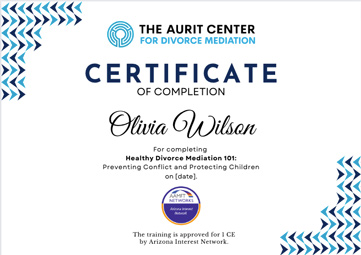How Therapists Can Prevent Conflict and Protect Children
By Michael Aurit, Esq., MDR and Karen Aurit, LAMFT
 THE AURIT CENTER
THE AURIT CENTER Healthy Divorce Mediation 101
By Michael Aurit, Esq., MDR and Karen Aurit, LAMFT
No registration is required.
Therapists and Counselors can positively impact their clients considering divorce by guiding them toward the healthier process of mediation. Parents can put their kids first by avoiding litigation in court. The Aurit Center for Divorce Mediation Co-Founders, Michael Aurit and Karen Aurit who teach at Arizona State University and Pepperdine University law schools present this engaging CE program. Approved by The Arizona Interest Network of AAMFT.

Approved by the Arizona Interest Network of the
American Association for Marriage and Family Therapy.
Healthy Divorce Mediation 101: How Therapists Can Prevent Conflict and Protect Children is designed to help clinicians understand how the divorce mediation process works from beginning to end. Participants will develop an understanding of the advantages of mediation compared to litigation.
Participants will understand the “client-centered” strategic divorce mediation process, including raising every relevant issue, explaining Arizona law, developing personalized options, strategically facilitating conversations, and guiding parties to their best possible agreements. Participants will understand foundational mediation concepts such as interest-based negotiation, clients’ self-determination, mediator impartiality, balancing, and mediation confidentiality.
We will highlight the parallels between mediation strategies with therapeutic interventions including reframing, future focus, mutualizing, asking questions, educating, preempting, giving hope and encouragement, harnessing momentum, anchoring, and acknowledging.
Michael Aurit, JD, MDR, is a Professional Mediator and the Co-Founder of The Aurit Center for Divorce Mediation in Arizona and The National Mediation Training Institute. He is also an Adjunct Professor of Law at The Straus Institute for Dispute Resolution at Pepperdine University School of Law and Arizona State University’s Sandra Day O’Connor School of Law. He is a former President of The Academy of Professional Family Mediators. He authors Raising Arizona Kids Magazine’s monthly column Courageous Co-Parenting. Michael is married to Karen Aurit, and they live in Phoenix, Arizona with their three and five-year-old daughters. Michael can be reached at michael@auritmediation.com.
Karen Aurit, LAMFT, is the Director and Co-Founder of The Aurit Center for Divorce Mediation in Arizona and The National Mediation Training Institute. Karen is a Licensed Associate Marriage and Family Therapist who specializes in mindfulness theory. She is also an Adjunct Professor of Law at The Straus Institute for Dispute Resolution at Pepperdine University School of Law and Arizona State University’s Sandra Day O’Connor School of Law. She authors Raising Arizona Kids Magazine’s monthly relationship column Healthy Love Habits. Karen is married to Michael Aurit, and they live in Phoenix, Arizona, with their three and five-year-old daughters. Karen can be reached at karen@auritmediation.com.
Parents’ failure to stop fighting and end the conflict in their relationship is the central cause of children’s poor adjustment five years after divorce (Wallerstein and Kelly, 1980; Cummings, E., Davies, 1994; Kelly and Emery, 2003). High parental conflict prevents children from accepting and integrating the divorce. It may also include the parents bad-mouthing one another to their children, which can cause serious long-term psychological issues for the children.
Decades after Wallerstein and Kelly’s (1980) research demonstrated the extent to which continued conflict during and after divorce can cause damage to children, custody battles and divorce wars rage on, damaging families and causing serious harm to children. Many people remain unaware that a healthier way to divorce is readily available. This is a missed opportunity to stabilize the family structure and preserve relationships.
In divorce mediation, a neutral mediator helps spouses respectfully reach mutually beneficial agreements on all divorce issues including dividing assets and debts, determining spousal support, and addressing all necessary parenting issues without the clients ever going to court.
Dr. Robert Emery (2001) found that parents who mediate their divorce have substantially better relationships with their children after a divorce than parents who litigate in court. For example, a startling 54% of children whose parents mediated their divorces had weekly phone contact with their non-resident parent twelve years after the divorce, compared to only 14% of children whose parents litigated in court.
By reducing conflict, parents also significantly reduce the time and cost of their divorce process and decrease the emotional strain for everyone involved. After divorce, the benefits of mediation continue as the mediated parenting plan provides a solid foundation for healthy co-parenting.
Mental health professionals may educate their clients about the benefits of mediation as evidence-based research shows mediation is better for children and families. A therapist’s natural interest in supporting families beyond active therapy is enhanced by guiding couples toward a healthy divorce process.
This 1-hour CE is designed to help clinicians understand:
“When therapists encourage divorce mediation,
families avoid a harmful court process that damages the well-being of children.”
– Michael Aurit, JD, MDR
“Therapists can extinguish divorce wars.
Together, we can shift family conflict away from the courts and lead families toward healthier communication and relationships”
– Karen Aurit, LAMFT
After viewing the video complete the form below to receive your Certificate.

 Divorce Mediation
Divorce MediationTherapists and professional family mediators…
We appreciate you
Your work improves the lives of parents and their children, and we are honored to be your partner in helping families.
— Karen and Michael Aurit